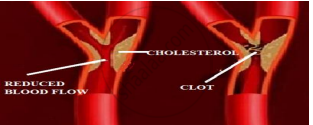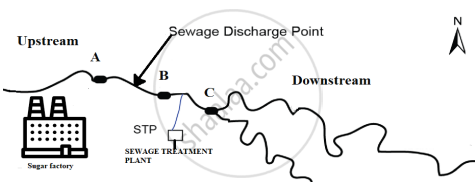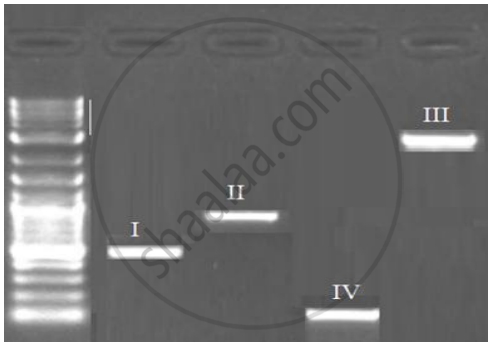Science (English Medium)
Academic Year: 2021-2022
Date: अप्रैल 2022
Duration: 2h
Advertisements
General Instructions:
- All questions are compulsory.
- The question paper has three sections and 13 questions. All questions are compulsory.
- Section–A has 6 questions of 2 marks each; Section–B has 6 questions of 3 marks each; and Section–C has a case-based question of 5 marks.
- There is no overall choice. However, internal choices have been provided in some questions. A student has to attempt only one of the alternatives in such questions.
- Wherever necessary, neat and properly labelled diagrams should be drawn.
Humans have innate immunity for protection against pathogens that may enter the gut along with food. What are the two barriers that protect the body from such pathogens?
Chapter: [0.07] Human Health and Diseases
A patient admitted in ICU was diagnosed to have suffered from myocardial infarction. The condition of coronary artery is depicted in the image below.
Name two bioactive agents and their mode of action that can improve this condition.

Chapter: [0.1] Biotechnology and Its Application
Substantiate by giving two reasons as to why a holistic understanding of the flora and fauna the cropland is required before introducing an appropriate biocontrol method.
Chapter: [0.11] Organisms and Populations
Identify the compound chemical structure is shown below. State any three of its physical properties.

Chapter: [0.05] Molecular Basis of Inheritance
Water samples were collected at points A, B and C in a segment of a river near a sugar factory and tested for BOD level. The BOD levels of samples A, B and C were 400 mg/L, 480 mg/L and 8 mg/L respectively. What is this indicative of? Explain why the BOD level gets reduced considerably at the collection point C?

Chapter: [0.04] Environmental Issues
An ecologist study an area with population A, thriving on unlimited resources and showing exponential growth, introduced population B and C to the same area. What will be the effect on the growth pattern of the population A, B and C when living together in the same habitat?
Chapter: [0.11] Organisms and Populations
Advertisements
With the decline in the population of fig species it was noticed that the population of wasp species also started to decline. What is the relationship between the two and what could be the possible reason for decline of wasps?
Chapter: [0.11] Organisms and Populations
With the increase in the global temperature, the inhabitants of Antarctica are facing fluctuations in the temperature. Out of the regulators and the conformers, which of the two will have better chances of survival? Give two adaptations that support them to survive in the ambient environment? Give one suitable example.
Chapter: [0.12] Ecosystem
How do normal cells get transformed into cancerous neoplastic cells? Elaborate giving three examples of inducing agent.
Chapter: [0.07] Human Health and Diseases
A person is suffering from a high-grade fever. Which symptoms will help to identify if he/she is suffering from Typhoid, Pneumonia or Malaria?
Chapter: [0.07] Human Health and Diseases
Recognition of an antigenic protein of a pathogen or exposure to a pathogen occurs during many types of immune responses, including active immunity and induced active immunity.
Specify the types of responses elicited when human beings get encountered by a pathogen.
Chapter: [0.07] Human Health and Diseases
In a pathological lab, a series of steps were undertaken for finding the gene of interest. Describe the steps, or make a flow chart showing the process of amplification of this gene of interest.
Chapter: [0.09] Biotechnology - Principles and Processes
Advertisements
‘The Evil Quartet’ describes the rates of species extinction due to human activities. Explain how the population of organisms is affected by fragmentation of the habitats.
Chapter: [0.01] Reproduction in Organisms
Introduction of alien species has led to environmental damage and decline of indigenous species. Give any one example of how it has affected the indigenous species?
Chapter: [0.01] Reproduction in Organisms
Could the extinction of Steller’s sea cow and passenger pigeon be saved by man? Give reasons to support your answer.
Chapter: [0.13] Biodiversity and Its Conservation
The image shown below is of a sacred grove found in India. Explain how has human involvement helped in the preservation of these biodiversity-rich regions.

Chapter: [0.13] Biodiversity and Its Conservation
The value of Z (regression coefficient) is considered for measuring the species richness of an area. If the value of Z is 0.7 for area A, and 0.15 for area B, which area has higher species richness and a steeper slope?
Chapter: [0.13] Biodiversity and Its Conservation
The image below depicts the result of gel electrophoresis -

If the ladder represents sequence length upto 3000 base pairs (bp),
- Which of the bands (I - IV) correspond to 2500 bp and 100 bp respectively?
- Explain the basis of this kind of separation and also mention the significance of this process.
Chapter: [0.05] Molecular Basis of Inheritance
Some restriction enzymes break a phosphodiester bond on both the DNA strands, such that only one end of each molecule is cut and these ends have regions of single stranded DNA. BamH1is one such restriction enzyme which binds at the recognition sequence, 5’-GGATCC- 3’and cleaves these sequences just after the 5’- guanine on each strand.
- What is the objective of this action?
- Explain how the gene of interest is introduced into a vector.
- You are given the DNA shown below.
5’ ATTTTGAGGATCCGTAATGTCCT 3’ 3’ TAAAACTCCTAGGCATTACAGGA 5’
If this DNA was cut with BamHI, how many DNA fragments would you expect? Write the sequence of these double-stranded DNA fragments with their respective polarity. - A gene M was introduced into E.coli cloning vector PBR322 at BamH1 site. What will be its impact on the recombinant plamids? Give a possible way by which you could differentiate non recombinant to recombinant plasmids.
Chapter: [0.05] Molecular Basis of Inheritance
GM crops especially Bt crops are known to have higher resistance to pest attacks. To substantiate this an experimental study was conducted in 4 different farmlands growing Bt and non Bt-Cotton crops. The farm lands had the same dimensions, fertility and were under similar climatic conditions. The histogram below shows the usage of pesticides on Bt crops and non-Bt crops in these farm lands.

- Which of the above 4 farm lands has successfully applied the concepts of Biotechnology to show better management practices and use of agrochemicals? If you had to cultivate, which crop would you prefer (Bt or Non- Bt) and why?
- Cotton Bollworms were introduced in another experimental study on the above farm lands wherein no pesticide was used. Explain what effect would a Bt and Non Bt crop have on the pest.
Chapter: [0.1] Biotechnology and Its Application
Other Solutions
Submit Question Paper
Help us maintain new question papers on Shaalaa.com, so we can continue to help studentsonly jpg, png and pdf files
CBSE previous year question papers Class 12 Biology with solutions 2021 - 2022
Previous year Question paper for CBSE Class 12 -2022 is solved by experts. Solved question papers gives you the chance to check yourself after your mock test.
By referring the question paper Solutions for Biology, you can scale your preparation level and work on your weak areas. It will also help the candidates in developing the time-management skills. Practice makes perfect, and there is no better way to practice than to attempt previous year question paper solutions of CBSE Class 12.
How CBSE Class 12 Question Paper solutions Help Students ?
• Question paper solutions for Biology will helps students to prepare for exam.
• Question paper with answer will boost students confidence in exam time and also give you an idea About the important questions and topics to be prepared for the board exam.
• For finding solution of question papers no need to refer so multiple sources like textbook or guides.
